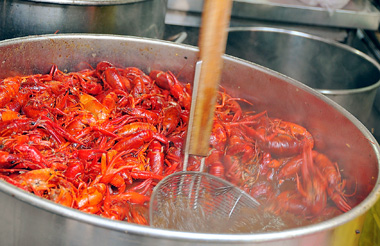FDA cracking down on crayfish wash powder
A WASHING powder used by restaurants to clean crayfish was banned by the Shanghai Food and Drug Administration yesterday.
Officials will confiscate the powder, destroy tainted crayfish and close businesses that break the rules in a two-day campaign. The administration will also investigate the source of the washing powder, which is widely used by restaurants.
Authorities said they banned the washing powder because it had no brand name, manufacturer, ingredients and instructions on the package, breaching the nation’s food safety rules.
Laboratory tests found its two major ingredients were citric acid, an acidity regulatory, and sulfite, a bleach. Both are legal food additives, but only allowed for specific foods in limited amounts to ensure food safety.
“Crayfish is not on the list for both food additives, which means the washing powder is illegal for washing crayfish,” said Gu Zhenhua, the director of the administration’s food inspection department. “Moreover, the powder also contains other ingredients we don’t know about so far.”
The crayfish washing powder is widely used by local restaurants for the efficient cleansing of crayfishes, which are usually dirty and muddy.
Some restaurant owners say washing crayfish is a headache. Staff need to spend a long time in washing them with brushes and they were sometimes attacked by their pincers. Washing powder can do the job simply by soaking the crayfish for 10 minutes.
Officials said they hadn’t received any complaints so far of food poisoning as a result of eating crayfish.
“We issued the ban and carried out the supervision as we were concerned about its potential harm,” said Du Bing, a food and drug administration official. “We became aware of the problem after our officials found the powder in routine checks and through media reports.”
At the city’s Tongchuan Road wet market, where some 14 tons of crayfish are traded every day, the washing powder is also available.
In some stores, buyers can get the washing powder for free if they buy in bulk. “There is no problem using the powder to wash crayfish. It’s been used for years and nobody has ever reported being poisoned,” said one wholesaler who didn’t want to be identified.
“We only sell the powder with the crayfish,” said another in answer to a request to buy some.
However, some wholesalers opposed use of the washing powder.
“The powder is not edible and bad for health,” said Cao Junming, a wholesaler in the wet market. “Crayfish is not very dirty.”













Leave your response!